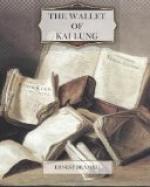“In such a manner was the foundation of Sen’s ultimate prosperity established, by which he came in the process of time to occupy a very high place in public esteem. Yet, being a person of honourably-minded conscientiousness, he did not hesitate, when questioned by those who made pilgrimages to him for the purpose of learning by what means he had risen to so remunerative a position, to ascribe his success, not entirely to his own intelligent perception of persons and events, but, in part, also to a never-failing regard for the dictates of the Five General Principles, and a discriminating subservience to the inspired wisdom of the venerable Poo-chow, as conveyed to him in the story of the faint-hearted youth and the three tigers. This story Sen furthermore caused to be inscribed in letters of gold, and displayed in a prominent position in his native village, where it has since doubtless been the means of instructing and advancing countless observant ones who have not been too insufferable to be guided by the experience of those who have gone before.”
CHAPTER IV
The experiment of the mandarin Chan hung
Related by Kai Lung at Shan Tzu, on the
occasion of his receiving
a very unexpected reward.
“There are certainly many occasions when the principles of the Mandarin Chan Hung appear to find practical favour in the eyes of those who form this usually uncomplaining person’s audiences at Shan Tzu,” remarked Kai Lung, with patient resignation, as he took up his collecting-bowl and transferred the few brass coins which it held to a concealed place among his garments. “Has the village lately suffered from a visit of one of those persons who come armed with authority to remove by force or stratagem such goods as bear names other than those possessed by their holders? or is it, indeed—as they of Wu-whei confidently assert—that when the Day of Vows arrives the people of Shan Tzu, with one accord, undertake to deny themselves in the matter of gifts and free offerings, in spite of every conflicting impulse?”
“They of Wu-whei!” exclaimed a self-opinionated bystander, who had by some means obtained an inferior public office, and who was, in consequence, enabled to be present on all occasions without contributing any offering. “Well is that village named ’The Refuge of Unworthiness,’ for its dwellers do little but rob and illtreat strangers, and spread evil and lying reports concerning better endowed ones than themselves.”
“Such a condition of affairs may exist,” replied Kai Lung, without any indication of concern either one way or the other; “yet it is an undeniable fact that they reward this commonplace story-teller’s too often underestimated efforts in a manner which betrays them either to be of noble birth, or very desirous of putting to shame their less prosperous neighbouring places.”




